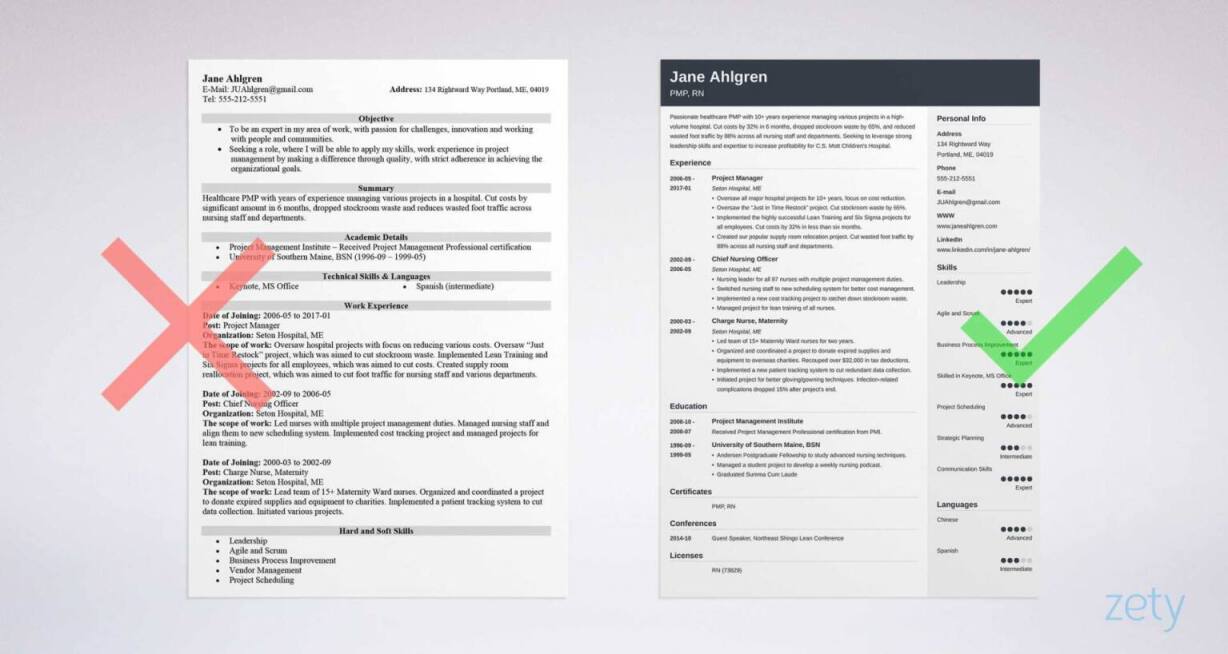What Are Soft Skills? List of the Best Examples
Create your CV nowIf you’ve spent any amount of time researching how to write a good CV and how to improve your career prospects, then you’ll have come across the importance of soft skills. It’s so common for employers to complain about ‘Millennials lacking soft skills’ that it’s almost become a cliché.
The trouble is most people can’t even tell you what soft skills are, much less what soft skills list you should include on your CV. That’s where this guide comes in. You’ll learn:
- What soft skills are.
- Which soft skill examples are best for your CV.
- How to find soft skills training opportunities to improve them.
Want to save time and have your CV ready in 5 minutes? Try our CV builder. It’s fast and easy to use. Plus, you’ll get ready-made content to add with one click. See 20+ CV templates and create your CV here.
Sample CV made with our builder—See more CV examples here.
And once you’ve got your soft skills nailed, we’ve got a wealth of other CV writing guides too.
- School Leaver CV Example & Guide
- Career Change CV Example & Guide
- Chef CV Example & Guide
- Internship CV Example & Guide
- Resume vs CV: What’s The Difference & Does it Matter
- What Should a CV Look Like?
- What is a CV & What Does CV Stand For
Sample Soft Skills CV
Maria Gonzalez
Ph: 0777 777 7777
Email: m.gonzalez.zety@gmail.com
Results-driven and team-focussed call centre supervisor with 5+ years of experience. Astrong believer in empowering team members through individualised coaching. Seeking to improve performance and upskill the team at Lithium Bank with innovative mentoring and team building.
Experience
Customer Service Agent & Call Centre Supervisor
Verdigris Finance, Nottingham
July 2014–Present
- Successfully promoted to supervisor within 12 months of joining due to constant self-directed learning and exemplary work ethic.
- Led team through significant business change, increasing size of the team by 50% while maintaining performance levels above corporate targets.
- Created a quarterly and annual review system that empowers employees by focussing on opportunities for growth and creating tailored improvement plans.
- Negotiated a new supply contract for headsets, resulting in a £5,000 annual saving.
Key achievement: Improved team’s overall work satisfaction results from 70% to 90% through effective and compassionate team building.
Education
English BA, September 2011–June 2014
University of Nottingham
Skills
- Mentoring. Enabled growth in team members through identifying individual skills gaps and giving one-on-one coaching.
- Emotional intelligence. Closely monitored team member’s behaviour to identify and respond to workplace tensions and stress.
- Delegation. Empowered future leaders by assigning them tasks that played to their strengths.
- Willingness to learn. Constantly took advantage of training opportunities and actioned suggestions for improvement.
- Constructive feedback. All performance reviews were presented in a positive manner that focused on opportunities for improvement.
Hobbies and Interests
- Netball. Volunteer coach and trainer for Sports England.
What Are Soft Skills?
They’re also really hard to define properly, so let’s expand on that definition and discuss why they’re important. The thing about soft skills is that they’re needed in pretty much every job. Soft skills are a universal requirement for career success.
Wherever you go and whatever you do, you need to be able to interact and communicate effectively with people. Whether that’s a colleague or a customer. Study after study has proven that soft skills are paramount, taking precedence over hard or technical skills in the modern workplace.
That’s not to say that hard skills aren’t important. But when an employer is faced with two candidates with otherwise identical hard skill sets ,it’ll be the candidate with the best soft skills who’ll get the job.
And that’s another way for you to understand what soft skills are, by comparing hard and soft skills. By contrast, hard skills are easily teachable, definable and measurable. Examples include your ability to operate a specific piece of equipment, speak a foreign language or analyse data.
You can download an app that’ll teach you a foreign language, and there’s a Common European Framework of Reference for Languages to measure how skilled you are. But consider a soft skill like leadership. You can’t really learn that from an app and there certainly isn’t a common framework for leadership.
To put it another way, a computer can translate a language quite well, but it certainly can’t lead a team. You get the picture. Soft skills are inherently human and emotional in nature.
So now we’ve got a clear soft skills meaning, let’s take a look at some soft skills examples.
Soft Skills List and Examples
Ultimately, soft skills can be condensed into seven broad categories. Here they are.
What Are the 7 Soft Skills?
- Communication
- Problem-solving
- Leadership
- Teamwork
- Adaptability
- Emotional intelligence
- Work ethic
You’ll see plenty of other soft skills examples in this guide, but all of them fall under one of those seven main headings. We’ll examine each of them in turn. But first, which soft skills are considered the most important?
One study revealed the executive perceptions of the top 10 soft skills needed in today’s workplace.
Here are the 10 soft skills examples that are considered essential traits by employers:
- Integrity
- Communication
- Courtesy
- Responsibility
- Interpersonal skills
- Professionalism
- Positive attitude
- Teamwork
- Flexibility
- Work ethic
It’s an interesting breakdown and worth bearing in mind for candidates in all careers. But there’s still a lot of overlap amongst those top 10 soft skills. That’s why we’ve condensed the list down further. Here it is.
1. Communication
Communication skills have always been at the top of the list of essential skills. To be effective in any job you need to be able to communicate well with others. And it’s not just about how you express your own ideas and requirements it’s about how you listen and respond to others too.
Communication is a two-way street and it overlaps with most of the other soft skills categories too. Here’s a list of communication skills examples.
- Writing skills
- Verbal communication
- Active listening
- Negotiation
- Persuasion
- Presentation skills
- Body language
- Clarity
- Friendliness
2. Problem-Solving
These skills aren’t just about handling difficult situations, it’s about preventing problems from happening, coming up with creative solutions and making improvements too. Here are some suggestions for your CV.
- Data analysis
- Data gathering
- Creative thinking
- Project planning
- Organisation
- Innovation
- Testing
- Prioritising
- Complaint resolution
3. Leadership
Leadership skills aren’t just for CEOs. Any situation that requires you to take initiative and have others follow your lead requires leadership skills. And that can be both as a manager or amongst your team colleagues. Here are some ideas you could include.
- Decisiveness
- Integrity
- Team building
- Mentoring
- Strategic thinking
- Change management
- Persuasion
- People Management
- Delegation
4. Teamwork
The French philosopher, Jean-Paul Sartre, famously said that ‘hell is other people’. But we could just as easily say ‘work is other people’. That’s not to say work is hell though!
In all seriousness, to be able to do your job effectively you need to be able to work well with others to deliver the best results. Here are a few examples of skills you need to be an effective part of a team.
- Conflict resolution
- Honesty
- Collaboration
- Trust
- Support
- Respect
- Constructive feedback
- Accountability
- Communication skills
5. Adaptability
The nature of work changes, each day brings new challenges, situations evolve over time. To be a good employee it’s essential to be adaptable. Here are some ideas for demonstrating that on your CV.
- Resilience
- Positivity
- Stress tolerance
- Managing expectations
- Open-mindedness
- Flexibility
- Initiative
- Willingness to learn
6. Emotional Intelligence
Emotional intelligence, also known as EQ, refers to your ability to recognise and manage your emotions and those of others. It allows you to relieve stress, defuse difficult situations and communicate effectively. These are some emotional intelligence skills you could include on your CV.
- Self-awareness
- Empathy
- Social skills
- Self-regulation
- Patience
- Self-control
This skillset overlaps with the other categories. Effective communication, leadership, teamwork, problem-solving and adaptability all require elements of emotional intelligence.
7. Work Ethic
It almost seems too obvious. All hiring managers want employees with the personal values to be motivated and effective at work. But that’s all the more reason to include some examples from this skillset on your CV. Here are a few examples.
- Professionalism
- Punctuality
- Productivity
- Discipline
- Time management
- Dependability
- Self-motivation
Again, there’s plenty of overlap between these categories, and if I wanted to I could keep going on listing soft skills. And you could do exactly the same on your CV. But bearing in mind the maximum length of your CV should only be two pages, you’ve got to stop somewhere. So how do you decide which list of soft skills belongs on your CV? That’s what we’ll cover next.
Read more: Key Skills for Your CV: Best List of Examples
When making a CV in our builder, drag & drop bullet points, skills, and auto-fill the boring stuff. Spell check? Check. Start building your CV here.
When you’re done, Zety’s CV builder will score your CV and tell you exactly how to make it better.
3. How to Choose a Soft Skills List for Your CV
As tempting as it is you can’t just throw together a random selection from the list of soft skills examples I’ve just given you. When it comes to writing your CV, you have to tailor your choices to the job you’re applying for. Here’s how to create a perfect fit.
Your number one source of information for choosing which skills to include is the job advert. In it you’ll find a job description, and that’s pretty much a wishlist for what the hiring manager wants in an ideal candidate.
So take a few minutes to sit down and study it carefully. You’ll see skills peppered throughout. Here’s an example to show you what to look for.
Successful candidates will be tactical and resilient focusing on working towards defined goals, rarely losing focus – the tenacity you bring to your role as a detective will help you deliver on these key attributes. You’ll critically analyse information and collaborate with others, combining insight and evidence to define root causes of some of the UK’s most complex problems/scenarios.
Everything you do, you’ll be adaptive to change to maintain flexible views as situations change and be able to show compassion to the communities you serve.
That example came from a job advert for a police detective. Everything that I’ve highlighted makes reference to skills. And if you were responding to that opportunity, those are the skills you would focus on.
That said, you can’t just copy and paste all the skills from the job advert into your CV skills section. It’d look too obvious and you might not actually possess all of them. Then you’d be lying on your CV and that has consequences. It’s fraudulent and can even lead to you being imprisoned.
So here’s how to do it honestly and effectively.
- List all of the skills you’ve highlighted in the job advert. As with my examples above, a lot of skills overlap so be sure to include related skills too.
- Then make another list, this time of your own skills. Think of your key achievements and accomplishments, your overall work experience and your education to come up with a complete list of your own skills.
- Now see what matches, remembering that lots of skills overlap, and choose 5–10 of those skills to include in your CV skills section.
And here’s the best way to write your skills section.
- Don’t just write a shopping list of skills, it’s important to show as well as tell. So add a sentence that shows how you demonstrate that skill.
- E.g. Stress tolerance. Able to calmly respond to challenging customer interactions.
But that’s not the only place you can reference skills on your CV. Make sure you work them into your work experience section too. For example, an applicant for the police job advert above might have a bullet point in their work experience section like this.
- Led Safer Neighbourhoods Team in a community with a rapidly changing demographic, adapting enforcement and putting community engagement at the forefront.
The applicant has just shown they’re adaptive, flexible and compassionate. Three key skills that are listed in the job description.
Soft skills also deserve a place in your CV summary, like in the following example.
Diligent customer service advisor with 5+ years experience. Adept in multi-channel customer communication and complaint handling. Seeking to further improve my customer engagement skills in a busy online environment.
That CV profile is less than 30 words long but it’s still packed with skills and is sure to make a good first impression on the hiring manager.
You can add extra sections to your CV to prove your skills too. They’re particularly useful when you don’t have much formal work experience. For example, you can show your skills through a CV hobbies and interests section.
Hobbies & Interests
- Tennis. Long-standing member of the Wandsworth Tennis Club. Doubles tournament player and coach for community youth team.
It works because playing and coaching a sport shows teamwork, leadership and communication skills. Other hobbies work too. For example, painting shows creativity and artistic skills. Just keep it relevant and relatable.
And if you’re writing a school-leaver CV or graduate CV or don’t have much work experience, you can work soft skills into your CV education section. This includes adding details about relevant modules/subjects you’ve studied, projects you’ve completed or extracurricular activities. For example:
BA History, September 2012–June 2015
University of Leeds
- Extracurricular activities—active member of University of Leeds Toastmasters and debating society.
You can also include skills when you write your cover letter. By mentioning key accomplishments you can add even more evidence to back up your list of soft skills.
But what if you’re not confident about your soft skills and abilities? You’ll remember I mentioned that soft skills are hard to teach, but they’re not impossible. Next we’ll take a look at how you can level up your soft skills to improve your career prospects.
Pro Tip: You may have heard of a skills-based CV. It does what it says on the tin and focuses on transferable skills instead of work experience. But it’s a really tough format to get right and recruiters really don’t like it. For most candidates it’s best to stick to the standard chronological CV format.
Read more: What to Include in Your CV and What to Include in Your Cover Letter
Soft Skills Training—How to Improve Soft Skills
Soft skills are more difficult to learn than hard skills but they’re not impossible, and whatever stage you’re at in your career you can benefit from improving them. Here’s how to do it.
- Ask your current employer if they offer any soft skills training. Many companies now engage specialist external training providers to deliver training to their staff.
- Speak to your school or university about what training they can assist with if you’re still in education.
- Look into free courses available through the Open University. They’re even endorsed by Google. Plus the government offers training opportunities too.
- Consider online training courses through providers like edX, Udemy and Coursera.
- Get feedback on what you need to improve from a trusted colleague or manager.
- Practise on a friend by role-playing workplace scenarios.
- Hire a skills coach if your budget allows you to.
Remember, soft skills are a plus in any job, but some groups of people get even more benefit from soft skills training. Studies show that school-leavers, new university graduates, the long-term unemployed and older workers get a particularly powerful boost from learning how to improve their soft skills.
Key Takeaway
No matter what career you’re in or how much experience you have soft skills are essential. Here’s a quick recap.
- Soft skills meaning—soft skills are personal attributes. They’re a combination of people skills, emotional skills, social skills, communication skills and personal character traits.
- They’re hard to teach but there are soft skills training opportunities available, and the stronger your soft skills are the better your career prospects.
- A soft skills list can be divided into seven main categories, but there’s a lot of overlap between them.
- When including soft skills on your CV make sure they’re targeted to the job, include them throughout your CV and provide proof of how you demonstrate them.
Plus, a great cover letter that matches your CV will give you an advantage over other candidates. You can write it in our cover letter builder here. Here's what it may look like:
See more cover letter templates and start writing.
Thanks for reading. Please let me know if there is anything else you’d like to know about CV soft skills. Or maybe you’d like to know how to answer soft skills interview questions. If you need any help at all, let me know in the comments section and I’ll be happy to reply.
About Zety’s Editorial Process
Our editorial team has thoroughly reviewed this article to ensure it follows Zety’s editorial guidelines. Our dedication lies in sharing our expertise and providing you with actionable career advice that offers you real value. Every year, the quality of our content attracts 40 million readers to our site. But that’s not all – we conduct original research to gain a detailed understanding of the labour market. We take pride in being cited by top universities and leading media outlets in the UK and worldwide.
Sources
- https://scholarworks.waldenu.edu/cgi/viewcontent.cgi?article=4772&context=dissertations
- https://www.coe.int/en/web/common-european-framework-reference-languages/level-descriptions
- https://eric.ed.gov/?id=EJ984831#:~:text=This%20study%20identified%20the%20top,%2C%20teamwork%2C%20and%20work%20ethic.
- https://www.luzerne.edu/career/pdfs/SoftSkillsintheWorkplace.pdf
- https://www.open.edu/openlearn/money-business/soft-skills-training
- https://www.gov.uk/career-skills-and-training
- https://scholarworks.waldenu.edu/cgi/viewcontent.cgi?article=1260&context=ijamt






